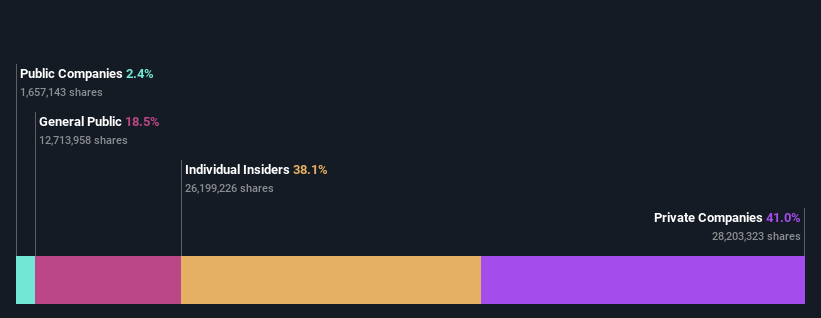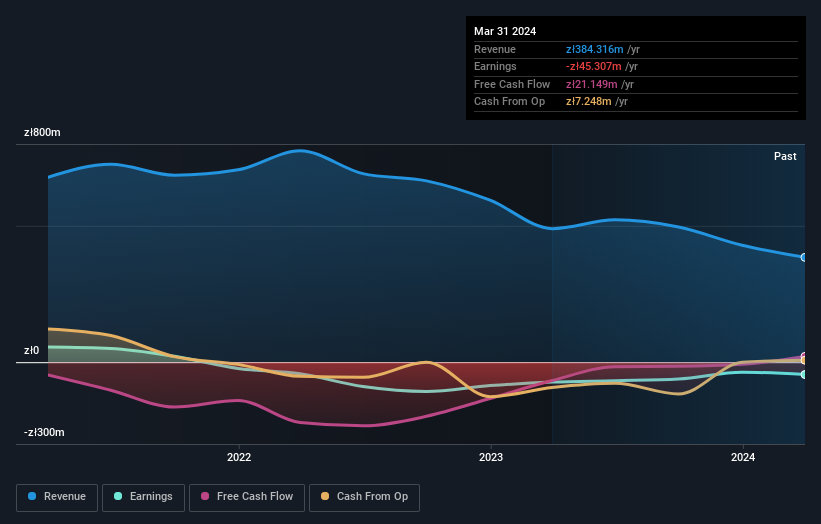- Poland
- /
- Electrical
- /
- WSE:CLC
Private companies among Columbus Energy S.A.'s (WSE:CLC) largest stockholders and were hit after last week's 13% price drop

Key Insights
- Columbus Energy's significant private companies ownership suggests that the key decisions are influenced by shareholders from the larger public
- A total of 2 investors have a majority stake in the company with 60% ownership
- 38% of Columbus Energy is held by insiders
If you want to know who really controls Columbus Energy S.A. (WSE:CLC), then you'll have to look at the makeup of its share registry. And the group that holds the biggest piece of the pie are private companies with 41% ownership. In other words, the group stands to gain the most (or lose the most) from their investment into the company.
While insiders, who own 38% shares weren’t spared from last week’s zł116m market cap drop, private companies as a group suffered the maximum losses
In the chart below, we zoom in on the different ownership groups of Columbus Energy.
See our latest analysis for Columbus Energy

What Does The Lack Of Institutional Ownership Tell Us About Columbus Energy?
Small companies that are not very actively traded often lack institutional investors, but it's less common to see large companies without them.
There are many reasons why a company might not have any institutions on the share registry. It may be hard for institutions to buy large amounts of shares, if liquidity (the amount of shares traded each day) is low. If the company has not needed to raise capital, institutions might lack the opportunity to build a position. It is also possible that fund managers don't own the stock because they aren't convinced it will perform well. Columbus Energy might not have the sort of past performance institutions are looking for, or perhaps they simply have not studied the business closely.

Hedge funds don't have many shares in Columbus Energy. Looking at our data, we can see that the largest shareholder is Gemstone S.A. with 40% of shares outstanding. Meanwhile, the second and third largest shareholders, hold 20% and 6.9%, of the shares outstanding, respectively.
A more detailed study of the shareholder registry showed us that 2 of the top shareholders have a considerable amount of ownership in the company, via their 60% stake.
While studying institutional ownership for a company can add value to your research, it is also a good practice to research analyst recommendations to get a deeper understand of a stock's expected performance. We're not picking up on any analyst coverage of the stock at the moment, so the company is unlikely to be widely held.
Insider Ownership Of Columbus Energy
The definition of company insiders can be subjective and does vary between jurisdictions. Our data reflects individual insiders, capturing board members at the very least. The company management answer to the board and the latter should represent the interests of shareholders. Notably, sometimes top-level managers are on the board themselves.
Most consider insider ownership a positive because it can indicate the board is well aligned with other shareholders. However, on some occasions too much power is concentrated within this group.
Our information suggests that insiders maintain a significant holding in Columbus Energy S.A.. Insiders own zł302m worth of shares in the zł792m company. We would say this shows alignment with shareholders, but it is worth noting that the company is still quite small; some insiders may have founded the business. You can click here to see if those insiders have been buying or selling.
General Public Ownership
With a 18% ownership, the general public, mostly comprising of individual investors, have some degree of sway over Columbus Energy. While this size of ownership may not be enough to sway a policy decision in their favour, they can still make a collective impact on company policies.
Private Company Ownership
We can see that Private Companies own 41%, of the shares on issue. Private companies may be related parties. Sometimes insiders have an interest in a public company through a holding in a private company, rather than in their own capacity as an individual. While it's hard to draw any broad stroke conclusions, it is worth noting as an area for further research.
Next Steps:
It's always worth thinking about the different groups who own shares in a company. But to understand Columbus Energy better, we need to consider many other factors. Consider risks, for instance. Every company has them, and we've spotted 3 warning signs for Columbus Energy you should know about.
Of course, you might find a fantastic investment by looking elsewhere. So take a peek at this free list of interesting companies.
NB: Figures in this article are calculated using data from the last twelve months, which refer to the 12-month period ending on the last date of the month the financial statement is dated. This may not be consistent with full year annual report figures.
New: AI Stock Screener & Alerts
Our new AI Stock Screener scans the market every day to uncover opportunities.
• Dividend Powerhouses (3%+ Yield)
• Undervalued Small Caps with Insider Buying
• High growth Tech and AI Companies
Or build your own from over 50 metrics.
Have feedback on this article? Concerned about the content? Get in touch with us directly. Alternatively, email editorial-team (at) simplywallst.com.
This article by Simply Wall St is general in nature. We provide commentary based on historical data and analyst forecasts only using an unbiased methodology and our articles are not intended to be financial advice. It does not constitute a recommendation to buy or sell any stock, and does not take account of your objectives, or your financial situation. We aim to bring you long-term focused analysis driven by fundamental data. Note that our analysis may not factor in the latest price-sensitive company announcements or qualitative material. Simply Wall St has no position in any stocks mentioned.
About WSE:CLC
Columbus Energy
Provides solar photovoltaics and heat pumps installation and maintenance services in Poland.
Low with imperfect balance sheet.
Similar Companies
Market Insights
Community Narratives



